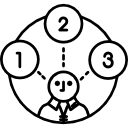What is computer science: Difference between revisions
Mr. MacKenty (talk | contribs) (Created page with "right|frame|System Fundamentals<ref>http://www.flaticon.com/</ref> This is pretty straight forward stuff. Nothing especially technical. We are concer...") |
No edit summary |
||
| (39 intermediate revisions by one other user not shown) | |||
| Line 1: | Line 1: | ||
[[file: | [[file:computation.png|right|frame|What is Computer Science?<ref>http://www.flaticon.com/</ref>]] | ||
I discovered this excellent treatment of disciplines within computing from the ACM<ref>https://www.acm.org/binaries/content/assets/education/curricula-recommendations/cc2020.pdf</ref>. | |||
Within the broad scope of computing there are five disciplines: | |||
* | * Computer Engineering (CE) | ||
* | * Computer Science (CS) | ||
* Information Systems (IS) | |||
* Information Technology (IT) | |||
* Software Engineering (SE) | |||
These disciplines share characteristics in the following lanes: | |||
* | * Organizational System Issues | ||
* | * Application Technologies | ||
* Software Development | |||
* Systems Infrastructure | |||
* Computer Hardware and and Architecture | |||
'''It is a mistake''' to use the term "computer science" when you in fact mean "software engineering". They are different! There is '''not''' universal agreement about these disciplines. | |||
A note about these files: they are fairly dense, and you may need to zoom in to read the characteristics of the different disciplines within computing. | |||
* [[Media:Computing_field.pdf|Click here for an excellent graphic identifying the different computing disciplines.]] | |||
* [[ | * [[Media:Field characteristics.pdf|Click here for a zoomed-in view of the five different disciplines.]] | ||
* [[ | |||
== References == | == References == | ||
Latest revision as of 22:41, 11 December 2022

What is Computer Science?[1]
I discovered this excellent treatment of disciplines within computing from the ACM[2].
Within the broad scope of computing there are five disciplines:
- Computer Engineering (CE)
- Computer Science (CS)
- Information Systems (IS)
- Information Technology (IT)
- Software Engineering (SE)
These disciplines share characteristics in the following lanes:
- Organizational System Issues
- Application Technologies
- Software Development
- Systems Infrastructure
- Computer Hardware and and Architecture
It is a mistake to use the term "computer science" when you in fact mean "software engineering". They are different! There is not universal agreement about these disciplines.
A note about these files: they are fairly dense, and you may need to zoom in to read the characteristics of the different disciplines within computing.
- Click here for an excellent graphic identifying the different computing disciplines.
- Click here for a zoomed-in view of the five different disciplines.